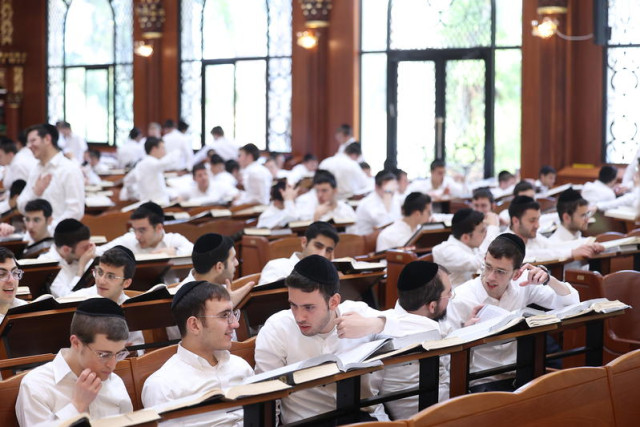Too busy studying Talmud to think about God

Prompting Jewish students to think about God was the thought of one Jewish educational organization which set out to question Jewish middle and high school students as to how much time they devoted each day to thinking and talking about God.
The answer might surprise most people, because despite attending an orthodox Jewish school, around 80% of them dedicated about 10% to that activity. The explanation was lack of time, given the emphasis placed on Talmudic studies. That response was met by a huge “oy vey” (the Yiddish equivalent of Oh My!) by Sharon Freundel, Managing Director of Jewish Education Innovation Challenge (JEIC) the organization which conducted the survey.
The Talmud, a collection of writings compiled by rabbis and scholars from the 2nd to the 6th centuries C.E./A.D., contains discussions and interpretations of Jewish law and tradition. But do those ethical, legal and philosophical elements lend themselves to personal reflections about God?
That was why JEIC decided to equip Jewish educators “to bring God into the classroom in a systemized and organized way.” Freundel believes that, “kids and adults, alike, today are thirsting for a spiritual connection to something larger than themselves.” That contention compelled her to foster the development of a relationship with God, but, for her, that relationship should be based on “whatever one deems God to be.”
While recognition of the existence of an empty place inside each human being is central, in order to fill that void, it’s also paramount that there is not an endless menu of possibilities. Because when it comes to who God is and what He represents, the scriptures are very clear. Consequently, varied concepts of the Almighty only lead to everyone fashioning a custom-made deity in their own preferred image. That results in the rules, boundaries and commandments turning into a bespoke faith, depending upon its creator.
Freundel is quite right in her perception that there is a thirst for a spiritual connection. That would explain the fascination with people like Charlie Kirk and Cliff Knechtle, both of whose YouTube clips are watched by millions of young people who find their open campus discussions of God completely riveting. Their massive following is an unprecedented phenomenon which spans many countries and even languages as they bring forth biblical truths which are unfamiliar to this generation.
Freundel, on the other hand, believes that the significance of connecting to God is important in assisting people with “their Jewish identity formation, helping to ensure that they’re more committed lifelong Jews.”
Her goal is more focused upon an ethnic identity, accompanied by an understanding of the God who established Jews, setting them apart from all others. But here is the question. Will the strengthening of that peoplehood identity also accomplish filling that empty place which can only be satisfied by a personal connection with our Creator? Because these are two different objectives.
An individual can possess a healthy sense of who they are, whether referring to their gender, their role in life or their ancestry. However, the God-connection is one which transcends all identity, because it is a soul attachment, which satisfies the spiritual longing that was placed in each person from the moment they were conceived. There is, inside all of us, a deep need to plug into our source of life, which can only come from intimately knowing God.
It is best done by direct communication – speaking to Him (prayer), learning more about Him (reading the scriptures) and committing to the prescribed way we were meant to live, per what we were told. Nothing else can substitute – not rabbinical commentary, endless discussions or ritualistic customs, which can bring some contentment but can never hit the spot that was meant to be filled only by a loving God who knows us through and through.
In Freund’s prototype, however, her search for God comes in the form of “pairing off students for discussion, using technology to get kids to think, asking students to meditate or sit in nature, having students listen to music or create art.” All these are the exercises she believes produce God-centered learning.
Of course, it’s true that God can be found in the most mundane of pursuits, such as admiring nature or the inspiration which comes through art and music. But the best way to discover God is to open up one’s heart to the Supreme Being who is listening and ready to respond in many unique and individual ways. Always there to confirm His presence, He is found by to those who seek Him.
So, why not go directly to the source, rather than the creation? Another puzzling idea, put forth by JEIC, was to “create a program that uses a digital prayer book app to help students make Jewish prayer more personal.” But is anything more personal than the words that come from our own hearts, which relate to our specific circumstances, difficulties or personalities?
Expressions written by others do not necessarily articulate the profound needs which are unique to a person’s challenges or suffering. That comes from the deep recesses of the soul which were put inside of us. It is that longing which God relishes most, rather than the printed words on a page that can’t convey the true message of the heart.
So why are these students not encouraged to cry out individually or share their innermost thoughts and feelings with the God who made them? The idea of creating a God awareness is truly filled with merit, but how we approach the Almighty is just as important. It is often that perspective which helps us to be real before Him, as we fully expose everything to our Maker.
That is the place where God is found. Anxiously waiting to meet us at our most vulnerable and sensitive point. He can be trusted to see us as we are. Likewise, we can have the confidence that His love, forgiveness and mercy are all unearned. They are, rather, the benefits that come from being His children when we come to Him as ourselves. No prayer book, app or clever course of study will ever replace that, because God is only interested in the unvarnished version of who we are. It’s from that point that He takes over remaking us into His image! It doesn’t get more personal than that!

A former Jerusalem elementary and middle-school principal who made Aliyah in 1993 and became a member of Kibbutz Reim but now lives in the center of the country with her husband. She is the author of Mistake-Proof Parenting, based on the principles from the book of Proverbs - available on Amazon.













